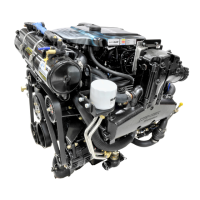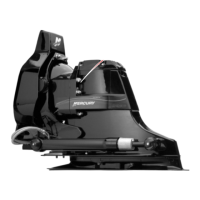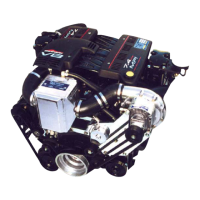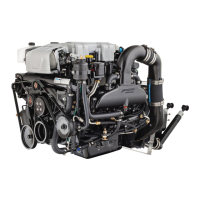22
CA12
How Elevation And Climate Affect Performance
Elevation has a very noticeable effect on the wide-open-throttle power of an engine. Since air (containing oxy-
gen) gets thinner as elevation increases, the engine begins to starve for air. Humidity, barometric pressure and
temperature do have a noticeable effect on the density of air. Heat and humidity thin the air. This condition can
become particularly annoying when the propeller testing was done on a cool, dry day. Then later; on a hot, sultry
day, the boat doesn’t seem to have the same performance.
Although some performance can be regained by dropping to a lower pitch propeller, the basic problem still exists.
In some cases, a gear ratio change to more reduction is possible and very beneficial.
Summer conditions of high temperature, low barometric pressure and high humidity all combine to reduce the
engine power. This, in turn, is reflected in decreased boat speeds, as much as 2 or 3 miles per hour in some
cases. Nothing will regain this speed for the boater, but the coming of cool, dry weather.
In pointing out the practical consequences of weather effects, an engine running on a hot, humid, summer day,
may encounter a loss of as much as 14% of the horsepower it would produce on a dry, brisk spring or fall day.
With the drop in available horsepower, this propeller will, in effect, become too large. Consequently, the engine
operates at less than its recommended rpm. This will result in further loss of horsepower at the propeller with
another decrease in boat speed. This secondary loss, however, can be somewhat regained by switching to a
lower-pitch propeller that allows the engine to again run at recommended rpm.
For boaters to realize optimum engine performance under changing weather conditions, it is essential that the
engine be propped to allow it to operate at or near the top end of the recommended maximum rpm range at
wide-open-throttle with a normal boat load.
Not only does this allow the engine to develop full power, but equally important is the fact that the engine also
will be operating in an rpm range that discourages damaging detonation. This, of course, enhances overall reli-
ability and durability of the engine.
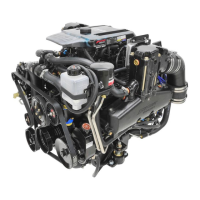
